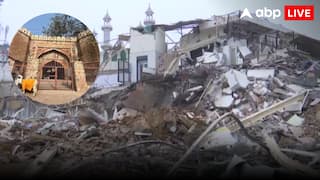'Very Carefully Calibrated' Actions On LAC To Protect India's Interests & Sensitivities, Says Army Chief
In his remarks at an event, Gen Pande advocated for "very carefully calibrated" actions on the LAC to protect India's interests and sensitivities.

Army Chief Gen Manoj Pande stated on Saturday that the situation in eastern Ladakh is "stable but unpredictable," amid a 30-month standoff between Indian and Chinese forces in the high-altitude region.
"If I have to describe it (situation) in a single sentence, then I will say that the situation is stable but unpredictable," Gen Pande was quoted as saying by news agency PTI.
Situation is stable but unpredictable: Army Chief Gen Manoj Pande on situation in eastern Ladakh
— Press Trust of India (@PTI_News) November 12, 2022
In an address to a think-tank, Gen Pande stated that the next round of military discussions will focus on resolving difficulties at the two remaining friction sites in the region, a reference to Demchok and Depsang.
"You are aware of the ongoing talks right at the political, diplomatic, and military levels which have been going on between the two sides. Because of these talks, we have been able to find resolution in five out of the seven friction points which were on the table," Gen Pande said, PTI reported.
The Army chief also stated that there has been no drop in the strength of Chinese troops along the Line of Actual Control (LAC) in the region, albeit there are signs of some PLA brigades returning with the arrival of winter as they arrived for collective training.
"As far as PLA's force levels are concerned, there has been no significant reduction," he said adding there are indications that some of their brigades, which have come for the purpose of collective training, are going back with the onset of winter, according to PTI.
The Army Chief stated that China's infrastructure development along the LAC in eastern Ladakh is "unabated," and that they are building helipads, airfields, and roads all the way up to the passes.
In his remarks at the 'Chanakya Dialogues,' Gen Pande advocated for "very carefully calibrated" actions on the LAC to protect India's interests and sensitivities.
"But in the larger context, we need to very carefully calibrate our actions on the LAC to be able to safeguard both our interests and sensitivities yet be prepared to deal with all types of contingencies," the Army Chief noted.
ALSO READ: J&K: Terrorists Fire Upon Two Non-Local Labourers In Anantnag, Says Police
"As far as our preparations are concerned, our transition to the winter posture is currently underway. But We have also made sure that we have adequate forces and adequate reserves to be able to deal with any contingency," he stated, PTI reported.
The Chief of Army Staff also mentioned the two sides' meetings last month under the framework Working Mechanism for Consultation and Coordination (WMCC) on India-China Border Affairs.
"We are looking at the next date for the 17th round (of military negotiations), and that is where I feel we will find resolution in these two locations (Demchok and Depsang) through conversation," he added, PTI reported.
On July 17, the 16th round of high-level military negotiations took place.
In accordance with the meeting's resolution, the two sides disengaged from Patrolling Point 15 in the Gogra-Hotsprings area in September.
When asked about Chinese President Xi Jinping's call for PLA troops to be ready to fight and win wars, Gen Pande said the Indian military must concentrate on Chinese actions.
"We all know that what the Chinese say and what they do is quite different. It is also part of their deception, or their nature, their character. What they say or articulate, we need to...But perhaps we need to focus on their actions rather than what is there in the written text or scripts or their articulation. Perhaps, then we will not go wrong," he was quoted by PTI.
Following a severe fight in the Pangong lake area, the eastern Ladakh border stalemate occurred on May 5, 2020.
Both sides increased their deployment progressively by pouring in tens of thousands of soldiers and heavy equipment.
Following a series of military and diplomatic discussions, the two parties concluded the disengagement process on the north and south banks of Pangong Lake, as well as in the Gogra region, last year.
The disengagement in the Pangong Lake area occurred in February of last year, while soldiers and equipment were withdrawn from Patrolling Point 17 (A) in Gogra in August of last year.
(With Inputs From PTI)





































